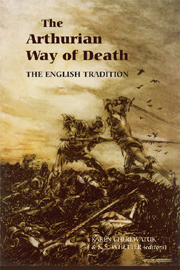Book contents
- Frontmatter
- Contents
- Illustrations and Tables
- Dedication
- List of Contributors
- Introduction
- Part I The early Tradition in england
- 1 ‘But here Geoffrey falls silent’: Death, Arthur, and the Historia regum Britannie
- 2 Mordred's Sons
- 3 Dying in Uncle Arthur's Arms and at His Hands
- Part II Middle English Romance and Malory
- Part III Medieval Influence and Modern Arthuriana
- Index
- Arthurian Studies
1 - ‘But here Geoffrey falls silent’: Death, Arthur, and the Historia regum Britannie
from Part I - The early Tradition in england
Published online by Cambridge University Press: 12 September 2012
- Frontmatter
- Contents
- Illustrations and Tables
- Dedication
- List of Contributors
- Introduction
- Part I The early Tradition in england
- 1 ‘But here Geoffrey falls silent’: Death, Arthur, and the Historia regum Britannie
- 2 Mordred's Sons
- 3 Dying in Uncle Arthur's Arms and at His Hands
- Part II Middle English Romance and Malory
- Part III Medieval Influence and Modern Arthuriana
- Index
- Arthurian Studies
Summary
After pages of what most commentators today regard as sheer invention, Geoffrey of Monmouth suddenly pauses his account of King Arthur to refer his audience to the ancient British book that he says is the source of his Historia regum Britannie:
Ne hoc quidem, consul auguste, Galfridus Monemutensis tacebit sed, ut in prefato Britannico sermone inuenit et a Gwaltero Oxenefordensi in multis historiis peritissimo uiro audiuit, uili licet stilo breuiter propalabit que prelia inclitus ille rex post uictoriam istam in Britanniam reuersus cum nepote suo commiserit.
(Nor will Geoffrey of Monmouth, most noble consul, be silent about this. Instead he will, with his lowly pen and briefly, set forth the battles which that famous king fought with his nephew upon his return to Britain after his famous victory, as he found them in the aforementioned British book, and has also heard them from Walter of Oxford, a man most learned in many histories.)
This reticence apparently refers to what has preceded the pause – Guenevere's marriage to the usurper Mordred – and it might seem that Geoffrey's strategic retreat at this point is motivated by decorum. However, what follows the invocation of the British book is also something Geoffrey might very much wish not to dwell on. The battle that takes place on Arthur's return from the continent, despite bringing the end of the Arthurian world, is surprisingly brief, and the notable deaths it brings about receive almost cursory treatment.
- Type
- Chapter
- Information
- The Arthurian Way of DeathThe English Tradition, pp. 17 - 32Publisher: Boydell & BrewerPrint publication year: 2009



